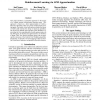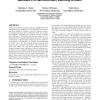71 search results - page 2 / 15 » An Analysis of Direct Reinforcement Learning in Non-Markovia... |
ATAL
2008
Springer
13 years 7 months ago
2008
Springer
Many multiagent problems comprise subtasks which can be considered as reinforcement learning (RL) problems. In addition to classical temporal difference methods, evolutionary algo...
IJCAI
2001
13 years 6 months ago
2001
Most formulations of Reinforcement Learning depend on a single reinforcement reward value to guide the search for the optimal policy solution. If observation of this reward is rar...
ATAL
2007
Springer
13 years 11 months ago
2007
Springer
Temporal difference reinforcement learning algorithms are perfectly suited to autonomous agents because they learn directly from an agent’s experience based on sequential actio...
AAAI
2010
13 years 7 months ago
2010
This paper introduces a principled approach for the design of a scalable general reinforcement learning agent. This approach is based on a direct approximation of AIXI, a Bayesian...
GECCO
2006
Springer
13 years 9 months ago
2006
Springer
Both genetic algorithms (GAs) and temporal difference (TD) methods have proven effective at solving reinforcement learning (RL) problems. However, since few rigorous empirical com...


